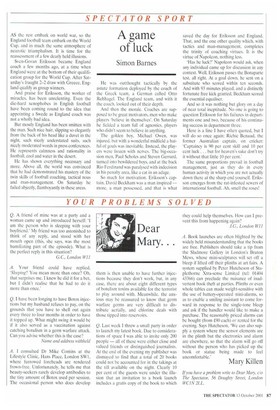A game of luck
Simon Barnes
AS the rest embark on world war, so the England football team embark on the World Cup, and in much the same atmosphere of neurotic triumphalism. It is time for the reassessment of a few dearly held illusions.
Sven-Goran Eriksson became England coach a few months ago, at a time when England were at the bottom of their qualification group for the World Cup. After Saturday's fraught 2-2 draw with Greece, England qualify as group winners.
And praise for Eriksson, the worker of miracles, has been unrelenting. Even the die-hard xenophobes in English football have been coming round to the idea that appointing a Swede as England coach was not a wholly bad idea.
But mostly England has been smitten with the man. Such nice hair, slipping so elegantly from the back of his head like a duvet in the night, such nicely understated suits, such nicely moderated words in press conferences. He represents calmness and rationality in football, cool and water in the desert.
He has shown everything necessary and more. Above all, the world was convinced that he had demonstrated his mastery of the twin skills of football coaching, tactical nous and man-management. On Saturday he failed abjectly, flamboyantly in these areas. He was outthought tactically by the astute formation deployed by the coach of the Greek team, a German called Otto Rehhagel. The England team, and with it the coach. looked out of their depth.
And then the morale. Coaches are supposed to he great motivators, men who make players 'believe in themselves'. On Saturday he fielded a team full of agnostics, players who didn't seem to believe in anything.
The golden boy, Michael Owen, was injured, but with a wonderful midfield a hatful of goals was inevitable. Instead, the players were frozen with nerves. The big-occasion men, Paul Scholes and Steven Gerrard, turned into bewildered boys, and at the back Rio Ferdinand was paralysed with indecision in his penalty area, like a cat in an adage.
So much for motivation. Eriksson's captain. David Beckham was a man inspired — more. a man possessed, and that is what saved the day for Eriksson and England. That, and the one other quality which, with tactics and man-management, completes the trinity of coaching virtues. It is the virtue of Napoleon, nothing less.
'Has he luck?' Napoleon would ask, when any individual came up for discussion in any context. Well, Eriksson passes the Bonaparte test, all right. At a goal down, he sent on a substitute who scored within ten seconds. And with 93 minutes played, and a distinctly fortunate free kick granted, Beckham scored the essential equaliser.
And so it was nothing but glory on a day of near total ineptitude. No one is going to question Eriksson for his failures in departments one and two, because of his continuing success in department three.
Here is a line I have often quoted, but I will do so once again: Richie Benaud, the former Australian captain, on cricket: 'Captaincy is 90 per cent skill and 10 per cent luck. .. but for heaven's sake don't try it without that little 10 per cent.'
The same proportions prevail in football management, just as they do in every human activity in which you are not actually down there at the sharp end yourself. Eriksson emerges from the rat-infested sewers of international football. Ah. smell the roses!


























































































 Previous page
Previous page